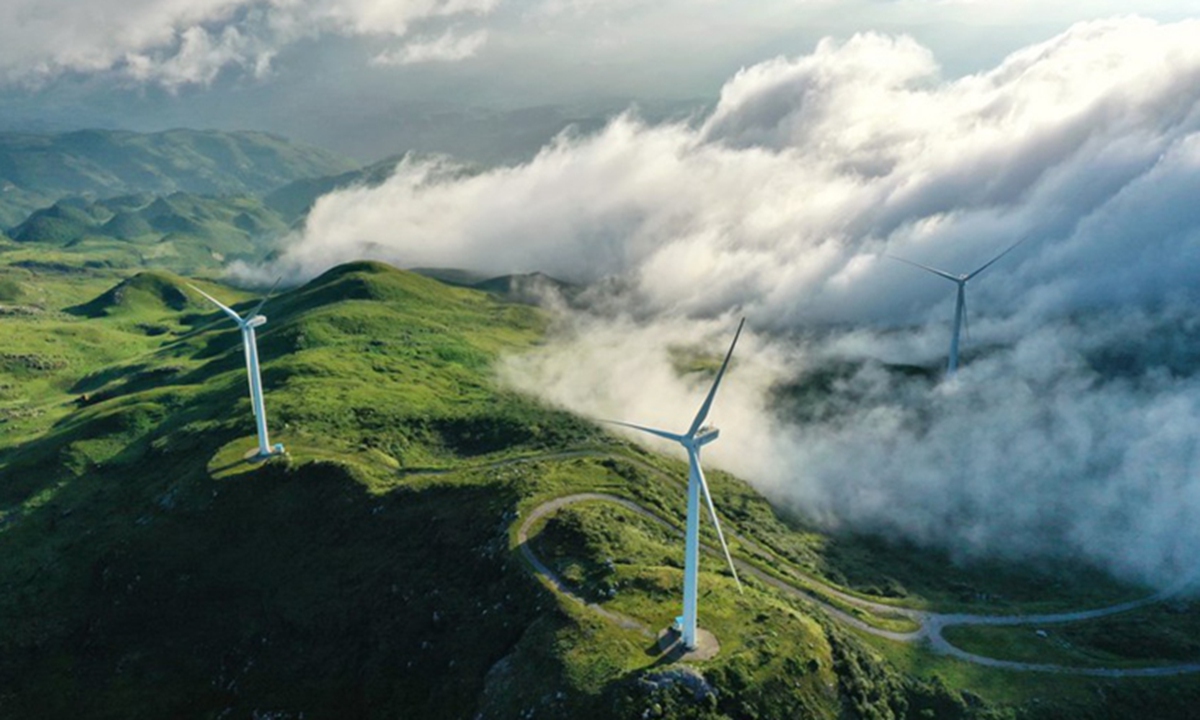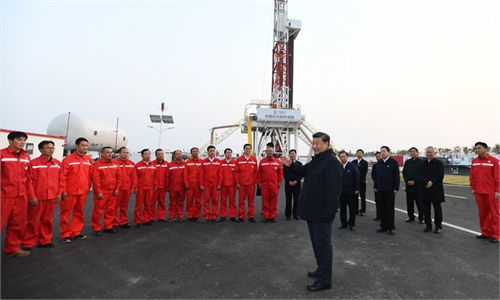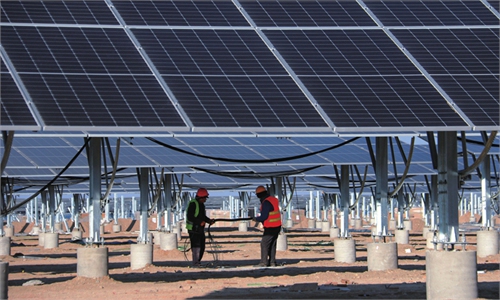
Aerial photo taken on August 19, 2020 shows wind turbines in Jiucaiping scenic spot in Southwest China's Guizhou Province. Photo: Xinhua
President Xi Jinping has called for proactive and prudent steps to advance carbon emissions peaking and carbon neutrality initiatives, while also stressing the need to ensure the security of energy, food, and industrial and supply chains in reducing carbon emissions, according to the Xinhua News Agency.
Xi made the remarks when he participated in the Inner Mongolia Autonomous Region delegation's deliberation at the Fifth Session of the 13th National People's Congress (NPC) on Saturday, Xinhua reported.
At the two sessions, namely the annual sessions of the NPC and the National Committee of the Chinese People's Political Consultative Conference (CPPCC), the top political advisory body, carbon emissions reduction goals and energy and food security have become hot topics.
We will take proactive and prudent steps to advance carbon emissions peaking and carbon neutrality initiatives, Xi said, while stressing that when carrying out carbon reductions, we must also ensure the security of energy, food, and industrial and supply chains, as well as the normal life and work of our people, according to Xinhua. We must not distant ourselves from realities and rush for quick results, he said.
The remarks underscored the country's firm commitment to pursuing its "dual carbon" goals step by step, while also ensuring energy security, experts said.
"Such words have sent a solid message of not adopting a one-size-fits-all approach to energy-consuming enterprises, but gradually introducing advanced energy-saving technology and steadily reducing carbon emissions," Han Xiaoping, chief analyst at energy industry website china5e.com, told the Global Times on Sunday.
At the two sessions, NPC deputies and CPPCC National Committee members have also put forward many suggestions and proposals on carbon emissions reduction.
Fu Jianhua, a member of the CPPCC National Committee, proposed a coordination mechanism to support clean, efficient and low-carbon coal use.
Li Shufu, an NPC deputy and chairman of Geely Holding Group, suggested comprehensively promoting the application of methanol vehicles to accelerate carbon neutrality in the transportation sector.
Methanol vehicles compared with gasoline vehicles are about 21 percent more efficient and 26 percent less carbon-dioxide intensive, Li said.
China will take well-ordered steps to achieve peak carbon emissions and carbon neutrality, and the action plan for peaking carbon emissions will be put into effect, according to the government work report submitted on Saturday to the NPC for deliberation.
According to the report, the country will reduce coal consumption in an orderly manner, promote the planning of large-scale photovoltaic power bases, increase the power grid's capacity to absorb electricity from renewable energy sources, promote the development and application of green and low-carbon technologies, and promote energy conservation and carbon reduction in the steel, non-ferrous, petrochemical, chemical and building materials industries.
Meanwhile, officials have also stressed the need to ensure security of energy and other areas in the pursuit of the dual carbon goals, experts noted.
To move in an orderly way toward carbon-peaking, enterprises should set their carbon reduction targets in line with reality and prevent energy shortages as a result of their pursuit of new and clean energy, Lin Boqiang, director of the China Center for Energy Economics Research at Xiamen University, told the Global Times on Sunday.
In terms of the key work for this year, traditional enterprises should speed up their transformation and use new energy to build wind power and photovoltaic bases, while coal enterprises should introduce advanced technology to make their operations more low-carbon and environmentally friendly, in line with the national carbon reduction standards, Lin said.


